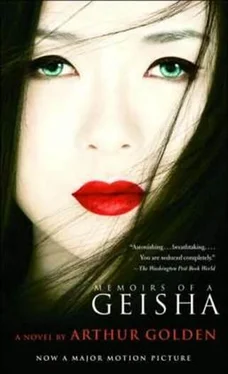At a certain point the Baron’s breathing slowed again. My skin was hot and quite damp from fear, so that when he released my robe at last and let it fall, I felt the puff of air against my side almost as a breeze. Soon I was alone in the room; the Baron had walked out without my even realizing it. Now that he was gone, I rushed to dress myself with such desperation that while I knelt on the floor to gather up my undergarments, I kept seeing in my mind an image of a starving child grabbing at scraps of food.
I dressed again as best I could, with my hands trembling. But until I had help, I could go no further than to close my underrobe and secure it with the waistband. I waited in front of the mirror, looking with some concern at the smeared makeup on my face. I was prepared to wait there a full hour if I had to. But only a few minutes passed before the Baron came back with the sash of his bathrobe tight around his plump belly. He helped me into my kimono without a word, and secured it with my datejime just as Mr. Itchoda would have done. While he was holding my great, long obi in his arms, measuring it out in loops as he prepared to tie it around me, I began to feel a terrible feeling. I couldn’t make sense of it at first; but it seeped its way through me just as a stain seeps across cloth, and soon I understood. It was the feeling that I’d done something terribly wrong. I didn’t want to cry in front of the Baron, but I couldn’t help it-and anyway, he hadn’t looked me in the eye since coming back into the room. I tried to imagine I was simply a house standing in the rain with the water washing down the front of me. But the Baron must have seen, for he left the room and came back a moment later with a handkerchief bearing his monogram. He instructed me to keep it, but after I used it, I left it there on a table.
Soon he led me to the front of the house and went away without speaking a word. In time a servant came, holding the antique kimono wrapped once again in linen paper. He presented it to me with a bow and then escorted me to the Baron’s motorcar. I cried quietly in the backseat on the way to the inn, but the driver pretended to take no notice. I was no longer crying about what had happened to me. Something much more frightful was on my mind-namely, what would happen when Mr. Itchoda saw my smeared makeup, and then helped me undress and saw the poorly tied knot in my obi, and then opened the package and saw the expensive gift I’d received. Before leaving the car I wiped my face with the Chairman’s handkerchief, but it did me little good. Mr. Itchoda took one look at me and then scratched his chin as though he understood everything that had happened. While he was untying my obi in the room upstairs, he said:
“Did the Baron undress you?”
“I’m sorry,” I said.
“He undressed you and looked at you in the mirror. But he didn’t enjoy himself with you. He didn’t touch you, or lie on top of you, did he?”
“No, sir.”
“That’s fine, then,” Mr. Itchoda said, staring straight ahead. Not another word was spoken between us.

Iwon’t say my emotions had settled themselves by the time the train pulled into Kyoto Station early the following morning. After all, when a stone is dropped into a pond, the water continues quivering even after the stone has sunk to the bottom. But when I descended the wooden stairs carrying us from the platform, with Mr. Itchoda one step behind me, I came upon such a shock that for a time I forgot everything else.
There in a glass case was the new poster for that season’s Dances of the Old Capital , and I stopped to have a look at it. Two weeks remained before the event. The poster had been distributed just the previous day, probably while I was strolling around the Baron’s estate hoping to meet up with the Chairman. The dance every year has a theme, such as “Colors of the Four Seasons in Kyoto,” or “Famous Places.” This year the theme was “The Gleaming Light of the Morning Sun.” The poster, which of course was drawn by Uchida Kosaburo-who’d created nearly every poster since 1919-showed an apprentice geisha in a lovely green and orange kimono standing on an arched wooden bridge. I was exhausted after my long trip and had slept badly on the train; so I stood for a while before the poster in a sort of daze, taking in the lovely greens and golds of the background, before I turned my attention to the girl in the kimono. She was gazing directly into the bright light of the sunrise, and her eyes were a startling blue-gray. I had to put a hand on the railing to steady myself. I was the girl Uchida had drawn there on that bridge!
On the way back from the train station, Mr. Itchoda pointed out every poster we passed, and even asked the rickshaw driver to go out of his way so we could see an entire wall of them on the old Daimaru Department Store building. Seeing myself all over the city this way wasn’t quite as thrilling as I would have imagined; I kept thinking of the poor girl in the poster standing before a mirror as her obi was untied by an older man. In any case, I expected to hear all sorts of congratulations over the course of the following few days, but I soon learned that an honor like this one never comes without costs. Ever since Mameha had arranged for me to take a role in the seasonal dances, I’d heard any number of unpleasant comments about myself. After the poster, things only grew worse. The next morning, for example, a young apprentice who’d been friendly the week before now looked away when I gave a bow to greet her.
As for Mameha, I went to visit her in her apartment, where she was recovering, and found that she was as proud as if she herself had been the one in the poster. She certainly wasn’t pleased that I’d taken the trip to Hakone, but she seemed as devoted to my success as ever-strangely, perhaps even more so. For a while I worried she would view my horrible encounter with the Baron as a betrayal of her. I imagined Mr. Itchoda must have told her about it… but if he did, she never raised the subject between us. Neither did I.
* * *
Two weeks later the seasonal dances opened. On that first day in the dressing room at the Kaburenjo Theater, I felt myself almost overflowing with excitement, for Mameha had told me the Chairman and Nobu would be in the audience. While putting on my makeup, I tucked the Chairman’s handkerchief beneath my dressing robe, against my bare skin. My hair was bound closely to my head with a silk strip, because of the wigs I would be wearing, and when I saw myself in the mirror without the familiar frame of hair surrounding my face, I found angles in my cheeks and around my eyes that I’d never before seen. It may seem odd, but when I realized that the shape of my own face was a surprise to me, I had the sudden insight that nothing in life is ever as simple as we imagine.
An hour later I was standing with the other apprentices in the wings of the theater, ready for the opening dance. We wore identical kimono of yellow and red, with obis of orange and gold-so that we looked, each of us, like shimmering images of sunlight. When the music began, with that first thump of the drums and the twang of all the shamisens, and we danced out together like a string of beads-our arms outstretched, our folding fans open in our hands-I had never before felt so much a part of something.
After the opening piece, I rushed upstairs to change my kimono. The dance in which I was to appear as a solo performer was called “The Morning Sun on the Waves,” about a maiden who takes a morning swim in the ocean and falls in love with an enchanted dolphin. My costume was a magnificent pink kimono with a water design in gray, and I held blue silk strips to symbolize the rippling water behind me. The enchanted dolphin prince was played by a geisha named Umiyo; in addition, there were roles for geisha portraying wind, sunlight, and sprays of water-as well as a few apprentices in charcoal and blue kimono at the far reaches of the stage, playing dolphins calling their prince back to them.
Читать дальше













